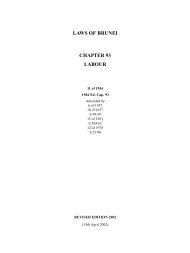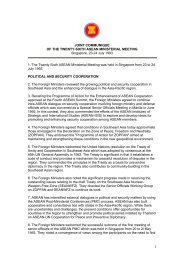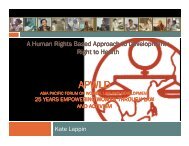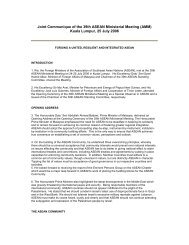4th RTD Summary of Proceedings (Final).pdf - Working Group for an ...
4th RTD Summary of Proceedings (Final).pdf - Working Group for an ...
4th RTD Summary of Proceedings (Final).pdf - Working Group for an ...
Create successful ePaper yourself
Turn your PDF publications into a flip-book with our unique Google optimized e-Paper software.
aised questions <strong>for</strong> discussion: (1) What will be the relationship <strong>of</strong><br />
the ASEAN bodies to be created with each other (2) Is there a need<br />
<strong>for</strong> such bodies Why or why not (3) Who should compose them<br />
(4) What should these bodies do (5) How are they to be created<br />
(6) How c<strong>an</strong> real impact be ensured<br />
12. After Pr<strong>of</strong>. Muntarbhorn’s initial exposition <strong>of</strong> issues, the particip<strong>an</strong>ts<br />
joined three break-out groups moderated by Ms. Sutarti Soedewo <strong>of</strong><br />
the Indonesi<strong>an</strong> Ministry <strong>for</strong> Women Empowerment, Dr. Budiono<br />
Kusumohamidjojo <strong>of</strong> the <strong>Working</strong> <strong>Group</strong>, <strong>an</strong>d Atty. Jake Mejia <strong>of</strong> the<br />
Commission on Hum<strong>an</strong> Rights <strong>of</strong> the Philippines. Rapporteurs from<br />
each break-out group then shared the results <strong>of</strong> the discussions in<br />
plenary. T<strong>an</strong> Sri Simon Sipaun <strong>of</strong> SUHAKAM reported the discussion<br />
<strong>of</strong> <strong>Group</strong> 1 which, while discussing other issues <strong>of</strong> concern, focused<br />
on the ACWC with the consensus that its establishment should go on<br />
but should not be at the expense <strong>of</strong> the AHRB. Their discussions<br />
included the rationale <strong>for</strong> a separate commission on women <strong>an</strong>d<br />
children <strong>an</strong>d its possible composition, the import<strong>an</strong>ce <strong>of</strong> the<br />
protection elements <strong>of</strong> the AHRB <strong>an</strong>d <strong>of</strong> the ToR providing<br />
benchmarks <strong>for</strong> such m<strong>an</strong>date including the competence to receive<br />
communication from individuals in the evolution process. <strong>Group</strong> 1<br />
also endorsed the results <strong>of</strong> the Joint Roundtable Discussion on the<br />
Establishment <strong>of</strong> <strong>an</strong> ASEAN Commission on the Protection <strong>an</strong>d<br />
Promotion <strong>of</strong> the Rights <strong>of</strong> Women <strong>an</strong>d Children <strong>of</strong> April 2008. Comm.<br />
Cardona <strong>of</strong> the CHRP presented the report <strong>of</strong> <strong>Group</strong> 2 <strong>an</strong>d observed,<br />
among other things, that they agreed that the AHRB should go<br />
beyond promotion <strong>an</strong>d just getting reports, the ACWC should be<br />
established separately, <strong>an</strong>d all selection processes should be nonpoliticized<br />
<strong>an</strong>d non-partis<strong>an</strong>. <strong>Group</strong> 2’s discussion acknowledged the<br />
need <strong>for</strong> further dialogue to bridge the differing views on various<br />
issues dealing with hum<strong>an</strong> rights among governments <strong>an</strong>d civil<br />
societies in the ASEAN region. Ms. Braema Mathiapar<strong>an</strong>am <strong>of</strong> the<br />
Singapore <strong>Working</strong> <strong>Group</strong> relayed the discussions <strong>of</strong> <strong>Group</strong> 3 which<br />
was able to tackle all the questions. Highlights <strong>of</strong> their discussion<br />
include the agreement that the specialized bodies c<strong>an</strong>not merely be<br />
subsumed under a general AHRB but that the latter c<strong>an</strong> be similar to<br />
a governing parent body while the ACWC <strong>an</strong>d a suggested ASEAN<br />
Commission on Migr<strong>an</strong>t Workers (ACMW) are aligned with it but act<br />
independently albeit in cooperation with each other <strong>an</strong>d from a<br />
rights-based framework. They also discussed the value <strong>an</strong>d ratio <strong>of</strong><br />
having regional bodies (e.g., dist<strong>an</strong>ce <strong>of</strong> the UN <strong>an</strong>d the need to<br />
consider matters as our issues), as well as possible national selection<br />
procedures <strong>an</strong>d criteria <strong>for</strong> the composition <strong>of</strong> the bodies. The session<br />
was synthesized by Pr<strong>of</strong>. Muntarbhorn <strong>an</strong>d moderated by Dr. Budiono<br />
Kusumohamidjojo, Secretary-General <strong>of</strong> the Indonesi<strong>an</strong> <strong>Working</strong><br />
<strong>Group</strong> <strong>for</strong> <strong>an</strong> ASEAN Hum<strong>an</strong> Rights Mech<strong>an</strong>ism.<br />
13. In the final session, entitled “Conclusions <strong>an</strong>d Recommendations”,<br />
the particip<strong>an</strong>ts discussed <strong>an</strong>d adopted the proceedings <strong>of</strong> the<br />
Roundtable, including the conclusions <strong>an</strong>d recommendations. The<br />
session was moderated by Mr. M<strong>an</strong>asvi Srisodapol, Deputy Director-<br />
General <strong>of</strong> the Department <strong>of</strong> ASEAN Affairs <strong>of</strong> the Ministry <strong>of</strong> Foreign<br />
6








